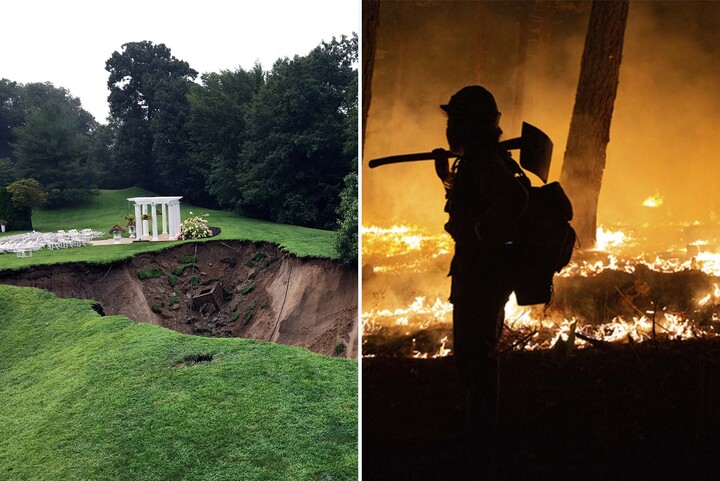BU Team Wins Major National Science Foundation Grant to Help PhD Students Attack Climate Change
$3 million five-year award will encourage multidisciplinary approaches to converting and storing sustainable energy

Intense flooding in Connecticut (left) and wildfires in Colorado (right) are recent examples of extreme weather events that researchers will use to explore solutions to climate change. Photos via AP/Daniel Brown/Sipa USA and via AP/Arnold Gold/Hearst Connecticut Media
BU Team Wins Major National Science Foundation Grant to Help PhD Students Attack Climate Change
$3 million, five-year award will encourage multidisciplinary approaches to converting and storing sustainable energy
If recent weather patterns and disasters, like extreme heat and droughts, catastrophic flooding, and devastating wildfires, have proven anything, it’s that better solutions for sustainable energy are needed to help combat the lasting effects of climate change.
Culminating an up-and-down two-year journey, Malika Jeffries-EL, a Boston University College of Arts & Sciences professor of chemistry, along with a team of BU researchers, has been awarded a five-year, $3 million Research Traineeship grant (NRT) from the National Science Foundation to help PhD students collaborate across disciplines to develop new ideas to convert and store sustainable energy sources. The award will create a new training program that unifies resources in engineering, chemistry, computer science, and data sciences to provide participating students with a broad exposure to energy-related issues.

“I was just really proud,” says Jeffries-EL, who is also the associate dean of the Graduate School of Arts & Sciences. “I was proud of myself and my team for doing their part and working so hard to get things through at the last minute. My point of pride is that I fought for this proposal. This was a two-year struggle to get this approved. It’s a very large grant and I’m so excited about the work ahead.”
Along with Jeffries-EL, the project’s co–principal investigators are Emily Ryan, a College of Engineering associate professor of mechanical engineering and of materials science and engineering, James Chapman, an ENG assistant professor of mechanical engineering, David Coker, a CAS professor of chemistry and of computing and data sciences, and Brian Kulis, an ENG associate professor of electrical and computer engineering.
The NRT Research Traineeship grant is a collaborative award between BU’s Institute for Global Sustainability and the Rafik B. Hariri Center for Computing and Computational Science & Engineering. (NRT grants are intended to assist graduate students in developing the skills, knowledge, and competencies needed to pursue a range of STEM careers.)
“Computation and data science are playing key roles in designing and discovering new materials to address society’s clean renewable energy needs,” says Coker, director of the Hariri Institute’s Center for Computational Science. “This NRT grant will fund the development of new graduate training programs that synergistically bring together data and computational scientists and materials fabrication, synthesis, and characterization experts to guide and educate a new generation of researchers capable of working at the intersections of these fields and pushing forward this critical frontier research.”
Jeffries-EL, who joined the CAS faculty in 2016, says that most scientists, herself included, begin their careers so focused on their own disciplines that they struggle to think and look outside their research silos. Climate change, she says, is simply too big, too broad, too daunting to continue approaching it in isolation. It is expected that over the NRT program’s five years, 100 to 125 BU PhD students will participate in the training.
“We are at a point where we need to be intentional with problems we are tackling,” Jeffries-EL says. “It’s all interconnected. These are complicated problems, and it requires an interdisciplinary approach and interdisciplinary science.”
And getting PhD students involved in the work is critical.
The grant, she says, is so important because it will allow PhD students, just starting out in their research, to immediately learn to think outside of their field. “We are going to catch them at the beginning. This is an intricate part of their training. If they make it all the way through graduate school [without doing interdisciplinary research], they won’t think they need to think this way. We will breed them to think about interdisciplinary research from the start.”
If chemists and data scientists and engineers and biologists all start approaching the problem of climate change and sustainable energy by thinking together, rather than as individuals, Jeffries-EL says, the possibilities are endless.
“We are teaching students to think bigger to take on bigger challenges,” she says. “We have to encourage students to be bold and think big, and that you might fail, but that’s OK, because you will learn as you go.”
We are teaching students to think bigger, to take on bigger challenges. We have to encourage students to be bold, and think big, and that you might fail, but that’s OK, because you will learn as you go.
Ryan, an associate director of the Institute for Global Sustainability (IGS), says society needs cleaner energy storage and generation technologies to reduce greenhouse gas emissions and overcome the challenges brought about by climate change.
“The next generation of scientists and engineers will require a multidisciplinary background and perspective to develop the energy systems of tomorrow,” Ryan says. “We will partner with BU’s Institute for Global Sustainability to provide students a broader education in energy and climate change that includes not only the technical aspects, but also incorporates health, justice, policy, and more to positively impact society. The cutting-edge technology research at BU along with the diverse expertise of IGS will provide students a unique education that would not be possible elsewhere.”
As an example of how an interdisciplinary approach could work, she points to BU’s new Faculty for Computing & Data Sciences.
“Everybody is benefiting from data science,” Jeffries-EL says. “Some are more attentive to what it might do for them. If we can think about how we can leverage data science in many different fields, that will help people have the right mindset around this. It’s all about getting people to think differently from the start.”
The reason sustainable energy research is so important, Jeffries-EL says, is that with so much attention focused on creating and growing new energy sources, from wind to solar, there needs to be an equal amount of time spent on finding ways to harness those new sources of renewable energies.
“We need to be more mindful about how we use energy, and how we store energy. I was fortunate to find like-minded people with the same interest. We can create all the energy in the world, but if we can’t store it in batteries or in some other way, it’s useless. How do you harness the energy, and store and transport it?”
One lesson learned from the work of the BU Institute for Global Sustainability, Jeffries-EL says, “is that we can come up with the coolest technology in the world, but if no one trusts it, it will sit on the shelf.”
The new grant is the second time in two years that BU researchers have been awarded an NSF Research Traineeship grant. In 2023, a $3 million grant went to “A Convergent Training Program on Biological Control,” codirected by Elise Morgan, ENG dean ad interim, and Mary Dunlop, an ENG associate professor. Their work is aimed at training a diverse group of PhD students for the workforce in biotech, synthetic biology, manufacturing, robotics, sustainability, and other sectors.

Comments & Discussion
Boston University moderates comments to facilitate an informed, substantive, civil conversation. Abusive, profane, self-promotional, misleading, incoherent or off-topic comments will be rejected. Moderators are staffed during regular business hours (EST) and can only accept comments written in English. Statistics or facts must include a citation or a link to the citation.